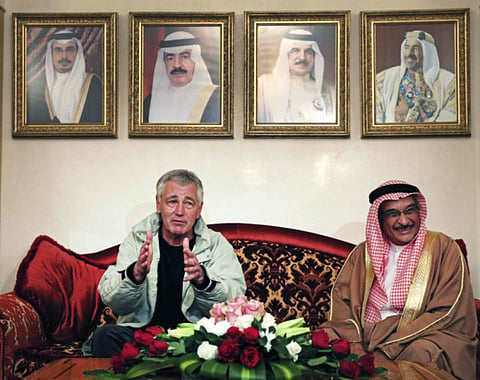Manama Diaolgue to open amid cautious optimism
US, Iran attend first major security forum following Geneva nuclear accord

Manama: Top international diplomats and defence and security officials will gather on Friday evening in the Bahraini capital Manama for the first major international security conference following the interim accord between the world’s powers and Iran in Geneva last month.
The agreement was welcomed by the six-member countries of the Gulf Cooperation Council (GCC), but expressed hopes that it would help boost security and stability in the region in a clear indication that the rapprochement between the US, their major security partner, and Iran, whom they have often accused of interference in their domestic affairs, must not be at their expense.
US Secretary of Defence Chuck Hagel is expected to use the forum to give new assurances to the Gulf countries that the deal with Iran would serve the interests of all parties in the region and beyond.
Iran, which has not reinstated its ambassador to Bahrain after recalling him in March 2011, will be represented at the three-day forum by Kazem Sajjadpour, the strategy adviser to the foreign minister.
Tehran in 2010 was represented by its then foreign minister Manouchehr Mottaki whose non-communication with then US Secretary of State Hillary Clinton as she tried to reach out to him over dinner at the start of the forum and afterwards was closely observed by guests and the media.
Iraq will be represented at the ninth Manama Dialogue by its foreign minister Hoshyar Zebari who was among the first participants to arrive in Bahrain and formally inaugurated the new premises of the Iraqi embassy.
“With some 20 foreign and defence ministers and dozens of senior national security officials already confirmed to participate, this year’s summit is poised to address key themes of Gulf and Middle East security including Syria, Egypt, regional conflict resolution, the management of political Islam and sectarianism as well as the future of GCC integration and military cooperation,” IISS (International Institute for Strategic Studies) said.
The Manama Dialogue, an annual inter-governmental summit seen as “a crucial pillar of the regional security architecture”, provides a platform for national security leaders from the Gulf, wider Middle East, North America, Europe and Asia to consult on key security and foreign policy challenges facing the region.
The widening international security relationships of the GCC will be among the top themes to be discussed at the conference on December 6-8.
Other issues include sectarianism and extremism in politics, the geopolitics of energy security in the Middle East and GCC military cooperation and regional security.
The GCC, made up of Bahrain, Kuwait, Oman, Qatar, Saudi Arabia and the UAE, was established in 1981.
The shifting military balance in the Middle East and the Arabian Gulf, the global security priorities for the US, Syria and the regional impact, intervention and mediation in defence diplomacy, and international interests in Middle East security will be discussed at the plenary sessions of the event.
Last year, the main speakers were William Burns, US deputy secretary of state, John McCain, ranking member of the US Senate Committee on Armed Services, Shaikh Khalid Bin Ahmad Al Khalifa, Bahrain’s foreign minister, Khalid Bin Mohammad Al Attiyah, then Qatar’s minister of state for foreign affairs and Prince Abdul Aziz Bin Abdullah Al Saud, Saudi Arabia’s deputy minister of foreign Affairs.
Other speakers were Abdul Lateef Al Zayani, the secretary general of the Gulf Cooperation Council (GCC), William Hague, UK secretary of state for foreign and Commonwealth affairs and Nasser Judeh, Jordan’s minister of foreign affairs.
Sign up for the Daily Briefing
Get the latest news and updates straight to your inbox



